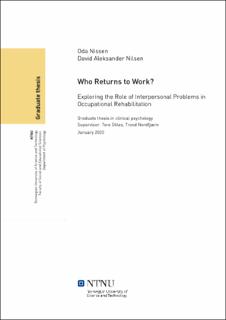Who Returns to Work? - Exploring the Role of Interpersonal Problems in Occupational Rehabilitation
Master thesis
Permanent lenke
https://hdl.handle.net/11250/2674392Utgivelsesdato
2020Metadata
Vis full innførselSamlinger
- Institutt for psykologi [3078]
Sammendrag
Background: Current interventions to facilitate return to work (RTW) after long-term sick leave
show weak effects, indicating the need for new approaches to the RTW process. The importance
of social relationships in the workplace is widely recognized in existing RTW literature, but
virtually no studies exist on the role played by the interpersonal problems of the returning
worker. Current research indicates that a subset of these – hostile-dominant interpersonal
problems – give particular disadvantages in several life areas.
Aims: This prospective cohort study aims is to test if (H1) higher levels of interpersonal
problems pre-admission predict lower likelihood of RTW in the year following occupational
rehabilitation, independently of symptom levels; if (H2) higher levels of hostile-dominant
interpersonal problems specifically predict such an effect; and whether (H3) any significant
associations found in H1 and H2 are weakened when controlling for changes in relational
impairment.
Methods: 189 patients on long-term sick leave completed a 3½-week transdiagnostic RTW
programme. Before treatment, self-reported interpersonal problems, relational impairment,
chronic pain, common psychological problems, insomnia and fatigue levels were collected. RTW
data for the following year was collected from the Norwegian Labour and Welfare
Administration.
Results: Three logistic regression analyses found that (H2) hostile-dominant interpersonal
problems significantly predicted RTW (AOR 0.618, 95% CI 0.41-0.93, p < .05), while (H1)
general interpersonal problems did not. (H3) Changes in relational impairment during the
rehabilitation stay had no impact on the strength of the relationship.
Conclusion: Hostile-dominant interpersonal problems negatively predict RTW after long-term
sick leave, indicating a potentially overlooked factor in the field of occupational rehabilitation.
The findings could help improve future research, intervention design and focus.
